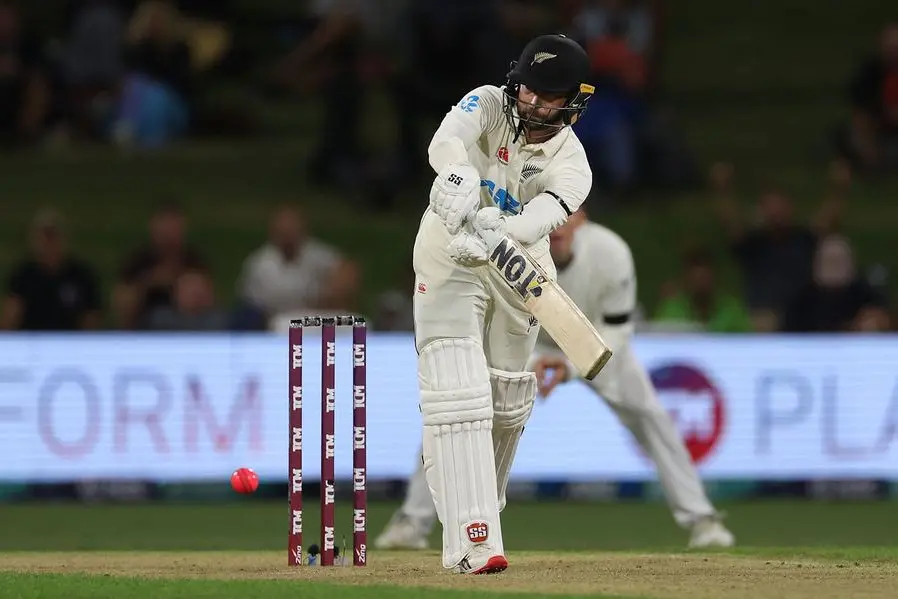PHOTO
High-octane batting and a precocious day-one declaration put England in control of the first Test against New Zealand in Mount Maunganui on Thursday.
The Black Caps limped to 37-3 at stumps in the day-night Test at the Bay Oval, having been thrust on to the back foot by England's swashbuckling 325-9 declared.
The tourists raced to their total in just 58.2 overs -- boosted by blistering half-centuries to Ben Duckett and Harry Brook -- as England opened the two-Test series with the sort of attacking approach, dubbed "Bazball", that has carried them to nine wins from their past 10 Tests under coach Brendon McCullum.
England captain Ben Stokes instructed his lower-order batsmen to throw the bat before calling them in, leaving 18 overs to bowl at the Black Caps under lights with a new pink ball.
The ploy worked as Tom Latham, Kane Williamson and Henry Nicholls departed before reaching double figures.
Evergreen seamer James Anderson took 2-11, including the key wicket of Williamson following an lbw review.
Opener Devon Conway will resume on 18 and nightwatchman Neil Wagner on four, with a deficit of 288 runs staring at them on Friday.
It was a grim response to an England innings that featured 48 fours and one towering six from Brook off the bowling of New Zealand captain Tim Southee, who was lashed for 2-71 from 13 overs.
New Zealand's depleted attack fought back midway through the second session when Ollie Pope, Joe Root and Stokes fell in quick succession, allowing debut pace bowlers Blair Tickner (1-72) and Scott Kuggeleijn (2-80) to claim their maiden Test wickets.
However, momentum was snatched back by the in-form Brook, who accelerated to 89 off 81 balls, supported by 38 from Ben Foakes.
The 23-year-old Yorkshireman Brook was poised to become only the second England batsman after Ken Barrington in the 1960s to hit centuries in four consecutive Tests but he fell short when playing on to veteran seamer Wagner (4-82).
Brook said he was aware of the record but his greater motivation was to put England into a strong position.
"I played the way I'm always going to play and try to put pressure on the bowlers," he said.
"I dug in for a little bit but then I decided it was time to go."
He said the declaration was deliberately timed to give world-class new-ball pair Anderson and Stuart Broad a chance to attack the top order.
"It's the best time to bowl, under these lights you can extract the most swing and seam," he said.
"We've got two of the best bowlers to ever play the game, so to get three of their top order out was really good."
- 'Exciting' approach -
Like Brook, Duckett was a revelation during the 3-0 series win in Pakistan in December and he maintained his hot streak with a rapid-fire 84 off 68 balls.
The hard-hitting opener had a chance of scoring England's fastest Test century -- surpassing Gilbert Jessop's 76-ball knock against Australia in 1902 -- before he fell to Tickner late in the first session.
Southee, leading his country at home for the first time, asked England to bat with the hope of exploiting the pink ball's swing on a green-tinged pitch that had been covered for days because of Cyclone Gabrielle.
Most of England's wickets fell to aggressive shotmaking, including Root, on 14, whose attempt at a reverse lap off Wagner was steered straight into the slip cordon.
Wagner said the free-wheeling England approach was anticipated but wasn't necessarily easy to combat.
"It's quite exciting for Test cricket. Hey, it's a positive brand, that's all you can sort of say," Wagner said.
"As a bowler, you want to try to combat that by taking wickets and I thought we did.
"Obviously they kept scoring at a high rate but that created chances, and we took them."
Preparations for both sides had been disrupted by the storms that hit New Zealand and triggered a national state of emergency on Tuesday, but Mount Maunganui avoided significant damage and play started on time.





















